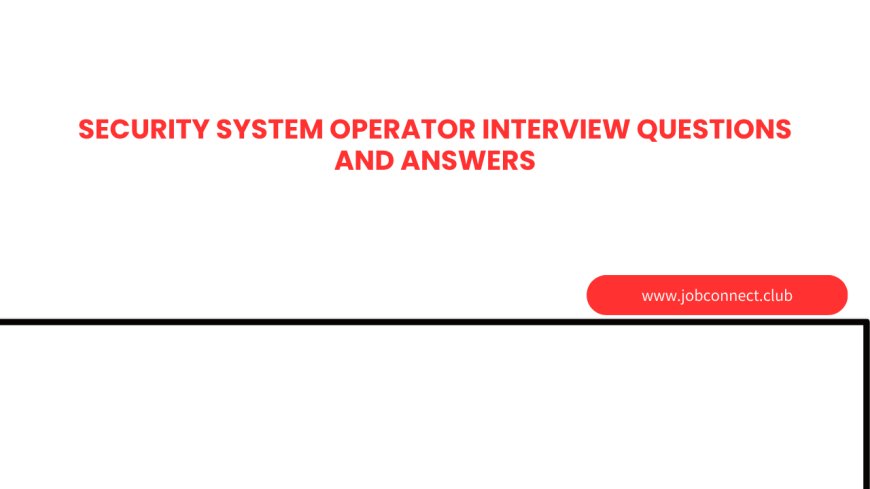Security System Operator Interview Questions and Answers
Security System Operator Interview Questions and Answers

Security System Operator Interview Guide
(Technical, Situational & Theoretical Questions)
A. Technical Questions
1. Core Responsibilities
Q: What is the role of a Security System Operator?
✅ Answer: Monitors and manages security systems (CCTV, alarms, access control) to protect premises, personnel, and sensitive data.
2. System Operations
Q: Explain how a CCTV system works.
✅ Answer: Cameras capture footage → transmit to monitors/recorders for live viewing and storage. (Example: TRA uses it to safeguard taxpayer data.)
Q: How do motion detectors work?
✅ Answer: Detect movement via infrared/microwave/ultrasonic sensors → trigger alarms/cameras.
3. Troubleshooting
Q: Steps to fix a malfunctioning camera?
✅ Answer:
-
Check power/connections
-
Restart software
-
Escalate to tech support if unresolved
4. Security Concepts
Q: What is access control? Why is it critical for TRA?
✅ Answer: Restricts entry to authorized personnel only → prevents unauthorized access to taxpayer data.
Q: Passive vs. active security systems?
✅ Answer:
-
Passive: CCTV (monitors)
-
Active: Alarms (responds to breaches)
B. Situational Questions
1. Emergency Response
Q: Fire alarm activates during your shift. Actions?
✅ Answer:
-
Locate alarm source
-
Notify emergency services
-
Evacuate staff
-
Monitor via CCTV
Q: Unauthorized person in restricted area?
✅ Answer:
-
Stop and verify credentials
-
Escort out if unauthorized
-
Report to supervisor
2. System Failures
Q: Power outage affects security systems?
✅ Answer:
-
Switch to backup power
-
Verify camera/alert functionality
-
Increase physical patrols
Q: Suspicious activity on camera?
✅ Answer:
-
Zoom/record footage
-
Alert security team
-
Preserve evidence
C. Theory-Based Questions
1. Security Theories
Q: Explain CPTED (Crime Prevention Through Environmental Design).
✅ Answer: Deters crime via design (lighting, sightlines, secured entry points).
Q: What is Defense in Depth?
✅ Answer: Multi-layered security (physical + digital + procedural controls).
2. Incident Analysis
Q: Importance of incident reports?
✅ Answer: Tracks trends, aids investigations, and improves future protocols.
D. Tanzania-Specific Context
1. TRA Challenges
Q: How can TRA enhance border security with technology?
✅ Answer:
-
Smart surveillance (AI cameras)
-
License plate recognition
-
Digital customs checks
Q: Security challenges for taxpayer data?
✅ Answer: Cyberattacks, insider threats, and physical breaches.
2. Improvement Proposals
Q: Suggest TRA security upgrades.
✅ Answer:
-
Real-time threat detection
-
Biometric access controls
-
Regular penetration testing
E. Advanced Scenarios
1. Crisis Management
Q: Bomb threat protocol?
✅ Answer:
-
Evacuate immediately
-
Notify authorities
-
Preserve CCTV footage
Q: Armed intruder response?
✅ Answer:
-
Activate panic alarm
-
Lock down areas
-
Follow police guidance
2. Operational Best Practices
Q: Ensure alertness during long shifts?
✅ Answer: Task rotation, short breaks, equipment checks.
Q: Handle negligent colleagues?
✅ Answer: Remind protocols → report repeat offenses → recommend training.
Key Takeaways for Candidates
-
Prioritize proactive monitoring (CCTV, access logs).
-
Know emergency protocols (fire, intrusions, system failures).
-
Apply security theories (CPTED, Defense in Depth) to real-world scenarios.
-
Tailor answers to TRA’s needs (data protection, border security).